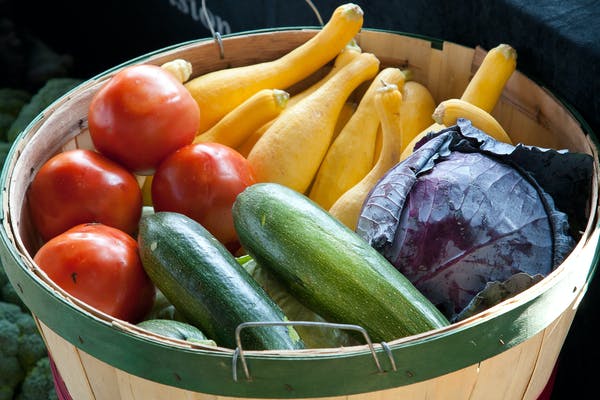Hacks to Keep Your Fruits and Veggies Fresh

Life is complicated enough without brown bananas, mealy apples, yucky lettuce or green potatoes. Do you toss what seems like newly bought fruits and veggies in the trash or down the disposal every week? If so, that’s just like tossing money in the trash or down the disposal, especially with the rising cost of produce, along with everything else…inflation sucks. Anyway, if you answered yes to my previous question (and I’m guessing we all did), then this post is for you.
Keeping fruits and veggies fresh comes down to a few factors: temperature, humidity, air flow and whether to seal them up or not. Obviously, different fruits and veggies require different conditions in order extend their lives, but what most people do not know is that some fruits and veggies release something called ethylene gas.
Ethylene gas is an odorless and colorless hydrocarbon gas that is released as some fruits and veggies ripen. This is significant because ethylene gas hastens the ripening and, thus, over-ripening, process in all fruits and veggies, whether they produce it or not. It, therefore, behooves you to store those fruits and veggies that emit ethylene gas away from those that do not. Here’s a quick list of those that emit ethylene gas: bananas, apples, avocados, tomatoes, cantaloupe, kiwi, peaches, onions, pears and peppers.
Now, let’s look at how specific fruits and veggies should be stored in order to keep them fresh as long as possible.
- Potatoes and sweet potatoes should be stored in a cool, dark place with good air flow and away from their ethylene emitting brethren. They should also be tossed if they sprout or turn green.
- Roots and tubers, like beets, turnips, carrots, parsnips and ginger should have their green tops removed as they pull moisture and nutrients from the roots. They should then be refrigerated and stored in a sealed container in your crisper drawer.
- Onions and garlic should not be refrigerated and should be stored in a cool, dry, dark location with good air flow. Remember, onions emit ethylene gas. Once an onion is cut, wrap it in plastic wrap and refrigerate.
- Leafy greens should be stored, unwashed, in a zip-loc bags with brown and/or slimy leaves removed. Moisture tends to promote wilting/rot and they should only be washed prior to serving. Escarole stores best and is great for soups and salads. Endive, kale, and watercress also hold their freshness quite well. Adding a paper towel will also help keep them from going bad.
- Apples and pears can be refrigerated in plastic bags and stored in the crisper. Apples, especially, love cooler temps and are stored by producers and shippers that way until they arrive at the market. Most of us simply store apples and pears on the countertop. However, their longevity will be extended if they’re refrigerated.
- Citrus fruits, such as oranges, lemons, limes and grapefruit will also last longer in the fridge and will do fine at room temperature if you plan on consuming them in a week or so. They tend to dry out if stored on the countertop over a week or develop mold in humid conditions.
- Berries can be washed with a 1:3 vinegar to water solution prior to being stored in your crisper. This will prevent the growth of mold. Just don’t forget to rinse them prior to consumption.
- Avocado halves and leftover guacamole can be spritzed with lemon juice in order to prevent them from turning brown from oxidation. However, this will only delay the onset of brownness for a day or so.
- Lemon juice can be acquired from a fresh lemon by simply puncturing the skin with a skewer and squeezing rather than ruining the whole lemon by cutting it in half.
- Broccoli can have its freshness extended by placing the stems in a cup of water in the fridge while wrapping the florets in a wet paper towel. Cauliflower will also benefit from a wet wrap.
- Asparagus can be treated the same as broccoli. Simply cut the stems as you would flowers and place them in a glass of water with a plastic bag covering the tops.
- Bananas seem to be the fruit most people complain about. To extend the life of bananas, hang them or, better yet, separate them and wrap each stem in plastic wrap as this will prevent the release of ethylene gas.
Food waste is good for no one. Not only have you wasted your hard-earned money, but it also wastes all the resources that went into planting, growing, harvesting and transporting the fruits and veggies that get daily tossed by the millions. This guide should help you combat that problem.
You must be logged in to post a comment.